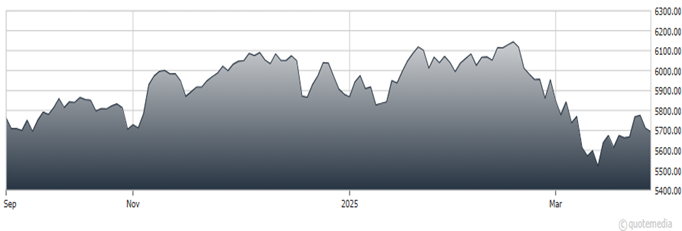March 2025 contained significant anniversaries of major events. All these anniversaries show that improbable and unexpected events not only can happen but DO happen with some frequency. That’s why I always recommend having some diversification and balance in your investment portfolio and flexibility in your financial plans, writes Bob Carlson, editor of Retirement Watch.
Patrick Henry delivered his “Give Me Liberty or Give Me Death” speech 250 years ago. This year and the next few years will be filled with the 250-year anniversaries of events related to the American Revolution.
The month contained the 60th anniversary of the civil rights march that began in Selma, Alabama. The march was met with violence along its route and is known as “Bloody Sunday.”
S&P 500 (SPX)

This month also featured the 25th anniversary of the peak of the technology stock bubble, also known as the Dot Com Bubble. The S&P 500 peaked on March 24, 2000, after rising 14.6% over four weeks.
The rise of stocks related to the new technology seemed relentless but suddenly hit a wall. The S&P 500 declined 25% in the next 12 months. The index hit bottom with a 49% loss in October 2002. The S&P 500 didn’t recover its losses until just before the pre-financial crisis peak in 2007, and didn’t fully recover the losses until 2013.
The technology-heavy Nasdaq 100 suffered more significant losses and took longer to return to the Dot Com Bubble peak.
This month also is the fifth anniversary of the World Health Organization’s declaration that Covid-19 was a pandemic. The same month, federal and state governments ordered most businesses to close and pushed many people into isolation.
March 2020 included the beginning of a recession and bear market that were the fastest, steepest, and shortest ever.
These anniversaries show the importance of protecting ourselves by avoiding some common mental mistakes. Most people are tripped up by thinking errors such as the recency effect, anchoring, and confirmation bias, among others.
It’s important to resist the temptation to rely primarily on information that supports or confirms what we’ve been thinking or are inclined to believe. People also are inclined to think that current conditions are normal or the base case, and that current trends and conditions will continue indefinitely.
You’ll make more by betting on one investment or economic environment if you’re right. But when the unexpected or unlikely happens, the results often are painful.










